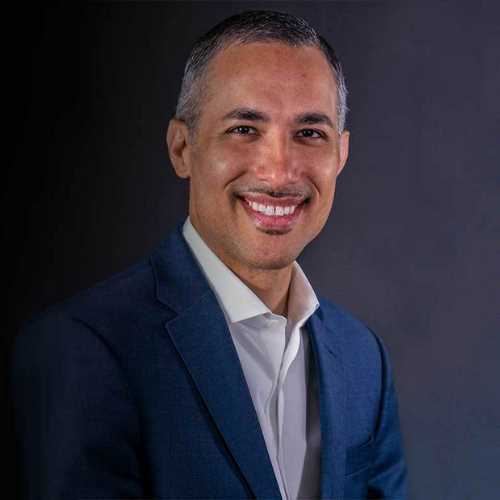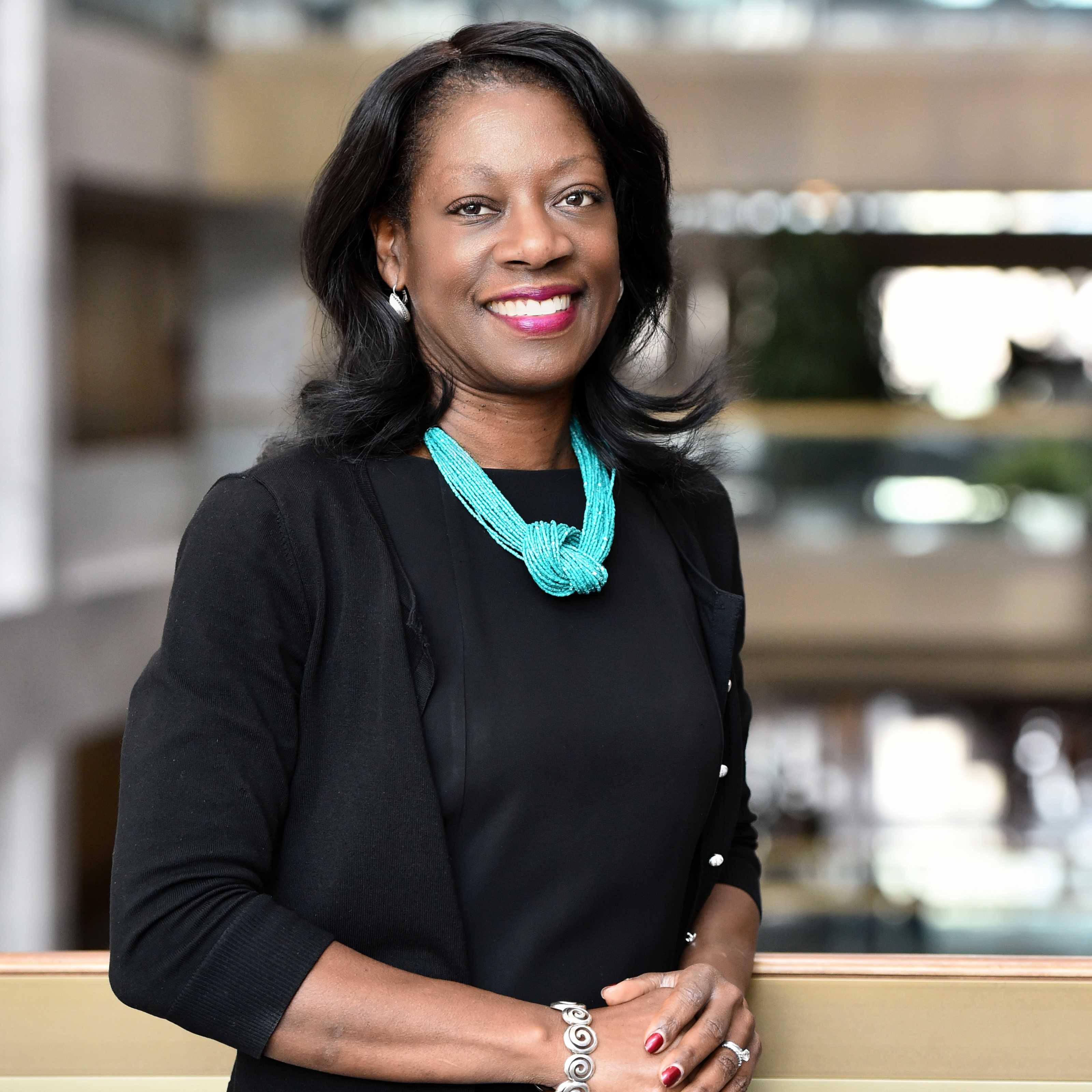
Rana el Kaliouby
- Pioneering AI Scientist and Inventor of Emotion and Human Perception AI
- Visionary Entrepreneur, Investor and Authority on Developing an AI Mindset for Competitive Advantage
- Expert on Designing and Implementing Ethical Business Strategies
- Deputy CEO, Smart Eye
- Co-Founder and Former CEO, Affectiva
- Bestselling Author of “Girl Decoded”
Travels From
Massachusetts
Humanizing artificial intelligence | Rana el Kaliouby
Rana el Kaliouby | Humanize Technology Before it Dehumanizes Us
Rana el Kaliouby: This app knows how you feel — from the look on your face
The Future of Emotion AI & The Empathy Economy | SXSW 2021
Rana el Kaliouby Speaker Biography
Rana el Kaliouby is an Egyptian-American scientist, entrepreneur, investor and an AI thought leader on a mission to humanize technology before it dehumanizes us! She is the Deputy CEO at Smart Eye and formerly, Co-Founder and CEO of Affectiva, an MIT spin-out. Rana is also General Partner at AI Operators Fund, an early stage AI-focused venture fund, a Venture Partner at BOLD Capital, as well as an executive fellow at the Harvard Business School. Her bestselling memoir, Girl Decoded: A Scientist’s Quest to Reclaim Our Humanity by Bringing Emotional Intelligence to Technology follows her journey, growing up in the Middle East and moving to the United States to become an entrepreneur and Emotion AI pioneer. Rana has a track record of translating technology innovations into products that address massive market needs including in automotive, health and robotics.
Rana is a Trustee at the Boston Museum of Science, as well as the American University in Cairo. She recently got named an Eisenhower fellow and is a World Economic Forum Young Global Leader. She is a member of the Young Presidents’ Organization (YPO) where she launched and is Chapter Chair of YPO Boston and organized YPO’s first-ever AI Summit. Rana is also co-chair of the Fortune Brainstorm AI conferences.
A TED speaker and co-host of a PBS NOVA series on AI, Rana has been recognized on Entrepreneur’s 100 Women of Influence, Fortune’s 40 Under 40 list, Forbes' Top 50 Women in Tech and Newsweek's top Disruptors and most recently in Boston Globe’s Top 50 Tech Power Players. She holds a Ph.D. from the University of Cambridge and a Post Doctorate from MIT.
Taking a Human-Centered Approach To Generative AI
Generative artificial intelligence (AI) tools like ChatGPT, DALL-E, Jasper and Midjourney are changing the business landscape, bringing powerful capabilities to nontechnical users. These models are sure to impact the future of work. Scientist, tech executive and early AI founder and investor Rana el Kaliouby wants workers to know AI won’t steal your job – but a person adept at using AI will. A Harvard Business School Executive Fellow who is also the Deputy CEO of Smart Eye, el Kaliouby couples her academic rigor with a practitioner’s experience to show organizations how they can adopt the necessary mindset change needed to start co-creating alongside AI.
A long-time authority on unpacking AI’s practical applications for gaining a competitive edge, she explains what these revolutionary tools are and how they work, then breaks down their current applications in the creative industry, marketing and coding. She reveals how organizations can leverage these large language models to reduce development time, generate innovative product ideas and craft fresh marketing, advertising and messaging materials, while keeping important ethics considerations top-of-mind.
Finally, she concludes with a future-forward look, exploring AI’s potential applications in fields like robotics, education and talent acquisition, as well as the job roles and titles that will need to be created as AI becomes fully embedded in our personal and professional lives.
Developing an AI Mindset
The speed of doing business in the 21st century is accelerating, and human-powered organizations must find an edge to remain competitive. For many businesses, this advantage can come from artificial intelligence (AI) tools, but deploying them effectively requires developing an AI mindset, says Smart Eye Deputy CEO Rana el Kaliouby, an early founder in the AI field. A Harvard Executive Fellow, el Kaliouby bridges industry experience and academics to deliver practical guidance on the cultural transformation steps required to take advantage of this disruptive technology.
Informed by experience, she delivers a “how to” guide to AI implementation, covering germane topics including where organizations need to invest to capitalize on data insights, how to break down data siloes, why an AI ethics statement matters and how to create one, and which low-hanging milestones to acknowledge.
Candid and peppered with entertaining and inspiring stories, el Kaliouby’s vivid case studies show businesses how to weave AI throughout the fabric of their organization in a way that helps them automate, accelerate, innovate and, ultimately, increase profits.
Creating a Competitive Advantage with AI
Organizations have access to more data than ever before, but few are leveraging that data to its fullest potential. A visionary pioneer in the AI field, Rana el Kaliouby has a practitioner’s view of how to utilize organizational data in a way that creates new opportunities. The deputy CEO of Smart Eye and the co-founder and former CEO of Affectiva, her blueprint provides reliable and practical guidance for organizations embarking on an AI implementation journey.
A successful leader of two AI-first companies, el Kaliouby shares with leaders various methods for understanding the existing wealth of data at their fingertips, then shows them how to leverage that data to resolve various business challenges. With a leader’s perspective, she effectively demonstrates how to communicate about AI transformation in a way that gets stakeholders to envision the possibilities and get on board.
By showing how AI tools can lead to not just economies of scale but also economies of scope, el Kaliouby teaches organizations of any size how they can use AI to discover new opportunities and design competitive advantages where previously none existed.
Empathetic Leadership as a Catalyst for AI-First Innovation
Having launched her career in the “affective computing” space where she trained algorithms to infer human feelings from facial expressions, Rana el Kaliouby, deputy CEO of Smart Eye and co-founder and former CEO of Affectiva, understands how new technology like AI can have an emotional impact on us. When a company starts to incorporate AI tools into their processes, employees and customers alike may feel concerned about privacy or safety.
The secret to bringing the advantages of AI to an organization, says el Kaliouby, is to lead with empathy. When a leader shows they understand fears and concerns associated with artificial intelligence, they can unleash an AI mindset, getting people excited to envision the possibilities of an AI-enabled organization.
Drawing on her experience as a pioneering AI founder, el Kaliouby offers actionable advice on how leaders can alleviate fears about job elimination, privacy, safety and more. Honest, forthright and engaging, el Kaliouby offers leaders a reliable model for leading with empathy in the Age of AI.
Girl Decoded: A Scientist’s Quest to Reclaim Our Humanity By Bringing Emotional Intelligence to Technology
In a captivating memoir, an Egyptian-American visionary and scientist provides an intimate view of her personal transformation as she follows her calling—to humanize our technology and how we connect with one another.
Rana el Kaliouby is a rarity in both the tech world and her native Middle East: a Muslim leader and CEO, a woman in charge in a field that is still overwhelmingly white and male. Growing up in Egypt and Kuwait, el Kaliouby was raised by a conservative father who valued tradition—yet also had high expectations for his daughters—and a mother who was one of the first female computer programmers in the Middle East. Even before she broke ground as a scientist, she broke the rules of what it meant to be an obedient daughter and, later, an obedient wife to pursue her own daring dream.
After earning her PhD at Cambridge, el Kaliouby, now the divorced mother of two, moved to America to tackle the growing empathy crisis in our culture. The majority of our communication is conveyed through non-verbal cues: facial expressions, tone of voice, body language. But that communication is lost when we interact with others through our smartphones and devices. The result is a digital universe that’s emotion blind, rendering us functionally autistic in cyberspace. To combat our fundamental loss of emotional intelligence online, she co-founded Affectiva, the pioneer in the new field of Emotion AI, enabling our technology to understand humans the way we understand one another. “Girl Decoded” chronicles Rana el Kaliouby’s journey from a “nice Egyptian girl” to a woman carving her own path as she revolutionizes technology. But decoding herself—learning to express and act on her own emotions—would prove to be the biggest challenge of all.
Emotion AI in the Time of COVID-19
Rana el Kaliouby has been thinking about how artificial emotional intelligence (Emotion AI) could preserve our emotions in a digital world, with a number of applications that are relevant in the COVID-19 pandemic: for example, understanding audience engagement during virtual events and meetings, gauging students’ reaction and comprehension in e-learning scenarios, and monitoring people’s mental health and wellbeing as many are dealing with anxiety right now.
In this presentation, el Kaliouby will discuss the role of tech in keeping us connected and how to preserve the qualities that make us human – our emotions and understanding of one another – as we increasingly live and work online.
How to Build AI That You Can Trust
As AI becomes more sophisticated, it will be increasingly performing or aiding in important tasks traditionally done by humans—from driving cars to teaching our children and caring for the sick and elderly. Given the nature of these roles, we should be able to trust the AI systems with which we will be interacting. It’s paramount that developers building these systems carry out their work with these considerations in mind, and create the next generation of AI with trust as its cornerstone.
Rana el Kaliouby, a leading pioneer in Human Perception AI, argues that the basis of trust is empathy, and ensuring AI is empathetic is key to having humans trust its competence. In this presentation, el Kaliouby outlines her “5 Tenets of the Social Contract Between AI and Humans.” She argues that to avoid systemic bias, diversity must be reflected not only in the data used to build the AI capabilities of the future, but also in the teams developing the systems. More specifically, AI has to be attuned to the needs of humans, understanding our complex emotions and cognitive states, and adapting to these appropriately. This framework will be essential to the companies and individuals who are forging the future, ensuring they make AI less artificial and more human.
How to Develop and Deploy Ethical AI
Through Emotion Artificial Intelligence (Emotion AI), Dr. Rana el Kaliouby is at the forefront of developing and deploying artificial intelligence that goes far beyond performing routine, repeatable tasks. But the ability to create such technology also requires an ethical structure for doing so.
As we face the consequences of AI that doesn’t recognize fundamental human values, el Kaliouby reveals how her journey as a scientist and entrepreneur has positioned her to address important ethical questions relating to potential bias, privacy and other issues that are increasingly a matter of public debate. She provides strategies for both the development of AI solutions and their practical deployment, teaching organizations how to factor ethical considerations into both areas.
Instructional as well as inspiring, this keynote can form the beginnings of a conversation for companies, entrepreneurs and academics alike on how ethics must catch up with the overwhelming pace of technological advancement that is reshaping our world.
Ethics as an AI Business Strategy
Dr. Rana el Kaliouby has always placed ethics at the heart of her mission as a scientist and entrepreneur. In addition to being true to her beliefs, avoiding bias and respecting consumer privacy with technology has served as a successful business strategy as well.
Affectiva, el Kaliouby’s company which she co-founded and serves as CEO, has grown to become a notable AI startup by positioning itself as an ethical organization. Under her leadership, Affectiva has gone as far as to turn down multimillion-dollar investments with entities whose practices and goals did not align with the founders’ moral values. Far from dooming Affectiva, this business strategy allowed it to thrive and attract the growing ranks of investors concerned with making money responsibly. This strategy, however, is not without risks.
In this presentation, el Kaliouby tells the story of how she built a morally rooted AI startup and convinced stakeholders to endorse a strategy that at times seemed fraught with challenges. As consumers and investors increasingly demand transparency and worry about the drawbacks of being part of a controversial organization, building an ethical business will be more of a necessary challenge to senior leaders and entrepreneurs. Dr. el Kaliouby has been there, done that and has crucial lessons for everyone treading the same path.
How Emotion AI Could Transform Health Care
AI-based virtual assistants are evolving quickly, and now, increasingly more effort and resources are being put toward making them emotionally intelligent – able to pick up on subtle cues in speech, inflection, or gesture and expression to assess a person’s health and wellbeing. Nurse avatars and social robots – such as Catalia Health’s Mabu, an emotion-aware personal care companion for terminally ill patients – are already proving their abilities to enhance patient-centered health care environments around the world, making routine processes more efficient, and improving experiences and outcomes. But their full potential is even more profound, and far from realized, believes Dr. Rana el Kaliouby.
Emotion AI, she says, provides an opportunity to transform numerous aspects of health and wellbeing, from telemedicine and drug efficacy to mental health research and autism support. By reading into vocal tone or detecting facial expressions, for example, emotion AI-enabled platforms could detect depression or even potentially underlying chronic conditions, such as heart disease. In telemedicine, mood-aware wearables could contribute to monitoring mental health and wellbeing, perhaps helping those with depression track their emotional state and share that data with their doctor.
Our emotional wellbeing and our health is intertwined, Dr. el Kaliouby explains. She discusses the future of health care – through the lens of emotion AI, delving deep into how far it has come and helping envision how far it can still go. Its promise is powerful.
Artificial Emotional Intelligence (Emotion AI) – What It Is and Why It Matters
Today’s devices work hand-in-hand with humans –at work, home, school and play. Dr. Rana el Kaliouby believes they can do much more. An expert in artificial emotional intelligence, or “Emotion AI,” Dr. el Kaliouby explores the valuable applications of humanized technology in media and advertising, gaming, automotive, robotics, health, education and more.
She explains how machine learning works, explores the potential for the development of emotion chips, and addresses the ethics and privacy issues of Emotion AI. In her talks, Dr. el Kaliouby gives participants an inside look at the world’s largest emotion data repository, shares results from her research studying more than 5 million faces around the world, and reveals that the emoji mindset may soon be a thing of the past.
Emotion AI and the Future of Work
With any technology advances and automation of tasks, it’s inevitable that jobs will change or disappear. However, artificial intelligence (AI) will, at the same time, create many new types of jobs that did not exist before, augment our abilities and complete menial tasks to free humans up to do the higher level strategic thinking and decision making. Computer scientist and AI expert Dr. Rana el Kaliouby envisions a world in which devices interact with us the same way we interact with one another – through conversation, perception and emotion. Before long, we won’t even remember when our relationship with technology was any different. El Kaliouby, who is currently developing emotion AI, is ensuring that in the near future our devices will have an emotion chip that can sense and react to people’s cognitive and emotional state with accuracy and empathy. Our mobile phones, cars, smart TVs, personal digital assistants and even our household appliances will be able to sense our emotion and cognitive states.
In this presentation, el Kaliouby reveals eight major ways that emotion AI will transform the future of work – from productivity companions and human-robot teams, to a complete re-imagination of our travel experiences and how we connect with one another – showing business leaders how new jobs will be created and why they must rethink how employees are trained (and re-trained) for the constantly evolving technology and business landscape.
Emotion AI Takes a Front Seat in Cars of the Future
Recent innovations around the autonomous car are shaking up the automotive industry. Beyond the issues of driverless or semi-autonomous vehicles, cars of the future are undergoing a fundamental shift in human-machine interaction. Consumers today crave more relational and conversational interactions with devices, as evidenced by the popularity of chatbots and virtual assistants like Siri and Alexa. Next-generation cars are emerging with advanced artificial intelligence systems that include conversational interfaces between the driver, passengers, the vehicle itself and its controls – all connected to the Internet of Things (IoT) and mobile devices individuals use.
Leveraging emotion recognition technology that senses and analyzes expressions of emotion, cars will soon come equipped with the ability to perceive our reactions and moods and respond accordingly. Dr. Rana el Kaliouby shows how these “emotionally aware” vehicles will benefit the automotive industry and consumers in a number of ways, such as improving road safety and jacking up the in-car experience with optimal personalization.
Marketing: How Emotion Analytics Drive Deeper Connections with Consumers
The marketing holy grail is building emotional connections with consumers while creating personalized experiences unique to the brand. Yet, marketers struggle to measure the success of their efforts. Dr. Rana el Kaliouby helps them learn to leverage emotion technology to hit the right chord. She points to examples drawn from the more than 1,400 brands already using it to measure and analyze how consumers respond to digital content, such as videos and ads, and even TV shows.
She explains why – and how – emotion data helps media companies, brands and advertisers improve their advertising and media spend, and predict sales uplift and virality. She also discusses experiential marketing, and how adding real-time emotion awareness to digital and retail experiences makes such campaigns so successful. Case in point: Hershey’s “smile for a sample,” which uses machines equipped with facial coding technology to distribute candy bars in exchange for smiles.
IoT: Mood-Aware Connected Home Devices That Can Make Life Better
The number of connected devices on and around us is growing exponentially (it will reach 25 billion by 2020, according to Gartner analysts). Ranging from wearable devices and cars to the TV, refrigerator, a mirror and social robots, these devices are designed to bring about positive behavior change as they persuade or motivate the user to do things differently, better, faster or more efficiently. But to be most effective, they need to be perceptual and in tune with our emotions, says Dr. Rana el Kaliouby. Imagine your fridge works with you to eat healthier, or your wearable device and television team up to get you off the couch. Your bathroom mirror senses you’re a bit stressed and adjusts your lighting while turning on the right mood-enhancing music.
Dr. el Kaliouby demonstrates how mood-aware machines have the potential to transform our homes and major industries. Often asked what the future holds for mood-aware technology, her answer is simple: it will be ubiquitous, engrained in the technologies we use every day, running in the background, making our tech interactions more personalized, relevant, authentic and interactive.
Personalized Learning That Leads to Dramatically Improved Outcomes
Artificial intelligence and Emotion AI get us closer to realizing personalized education with the potential to dramatically improve learning outcomes. Today, in online learning environments, it’s not until students take a test that the instructor knows whether the education was effective. Corrective actions take place after the fact. But what if intelligent learning systems could provide a personalized learning experience?
Such a system would know an individual and the individual’s unique learning style, sense levels of engagement or frustration, and then adapt in real time. Dr. Rana el Kaliouby shares how these intelligent systems would offer a different explanation when the student is frustrated, slow down a bit in times of confusion, and tell a joke when it’s time to have some fun – just the way an awesome teacher would.






























